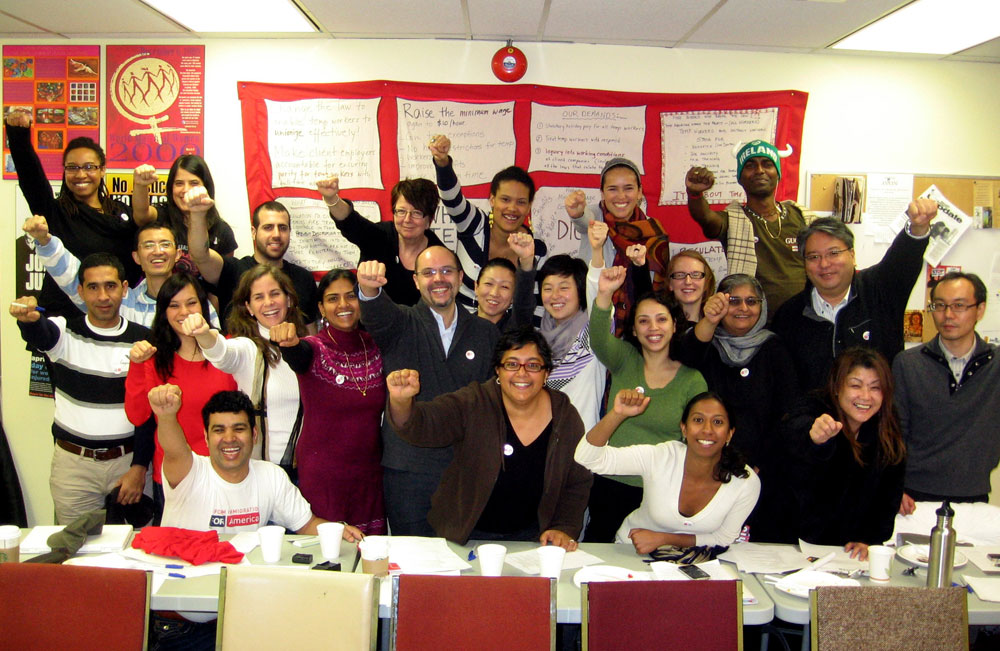
Editors’ Note: At NPQ, we have printed a number of appeals on behalf of nonprofits. Naturally, we will continue to do so. Yet at the same time, it is important for our sector to recognize the importance of protecting the communities we serve. As the the upcoming edition of our quarterly magazine reveals, during the Great Recession a decade ago, nonprofits did well, but the people we served—particularly low-income communities and communities of color—did not. (Last week, we published a set of articles from that forthcoming issue online, a series that will extend into this week and the next.) The health of our nation’s democratic institutions depends on the economic health of our communities. Our past failure as a sector to tend to that has cost us dearly. As today we face a shutdown of our economy on a scale not seen in modern times, we can ill afford a repeat of that experience.
Recognizing the power of speaking in unison, the Democracy at Work Institute (DAWI) aims to align with the priorities of allied organizations and add our voice to the chorus advocating for working people and small business. In particular, we drew heavily on the excellent work of the Institute for Local Self-Reliance and National Cooperative Business Association in formulating our own small business recommendations.
As an economic justice organization using the tool of shared business ownership, Democracy at Work Institute advocates for expanded coronavirus relief packages that prioritize the protection of working people and vulnerable communities. Bailouts of Wall Street and airlines will not rebuild a healthy society. The 156 million working people of the United States will do that, and relief should be focused on strengthening the social safety net that will protect and support them to rebuild.
Economic impacts will disproportionately affect women, poor families, people of color, and immigrant communities. The majority of members of worker cooperatives in the U.S. Worker cooperatives are small businesses, and many are in low-wage service and retail sectors—home health care, childcare, house cleaning, grocery—where the risks are higher and one finds few protections, limited access to healthcare, and no financial cushion. These workers, and millions more like them, face tough times ahead. They do not have the option to work from home, putting their health and their families’ health at risk. They are often living paycheck to paycheck, and any loss of income creates additional insecurity. They may not have ready financial resources to stock up on necessary provisions.
Sign up for our free newsletters
Subscribe to NPQ's newsletters to have our top stories delivered directly to your inbox.
By signing up, you agree to our privacy policy and terms of use, and to receive messages from NPQ and our partners.
As leaders move into Phase 3 of negotiating economic relief measures, we call on Congress to:
- Expand relief packages to further address the needs of vulnerable communities for both the immediate and the longer-term.
- Provide funding, including block grants, to state governments that have moved quickly to take emergency measures and may face budget pressures as a result.
The top priority for aid to small business should be grants and subsidies before loans. Specifically, we urge Congress to:
- Offer automatic, rapid-response subsidies and payroll advances.
- Offer accelerated low- and no-interest loans through SBA and the Treasury Department.
- Ensure that all cooperatives are eligible for SBA loans and waive personal guarantees for co-ops.
- Fund local organizations to do outreach and provide assistance to small business borrowers.
- Allow lenders to suspend loan payments, restructure loans, and relax underwriting requirements.
- Suspend evictions, foreclosures, and utility shutoffs for small businesses at a national level.
- Ensure that federal bailouts do not exacerbate market concentration by requiring spending parity.
Relief for small businesses must include aid to the small business workforce. Aid to individuals should not only focus on “taxpayer” relief but should also include poor families who don’t make enough to pay tax as well as the elderly. It must be comprehensive to be effective. Specifically, we urge Congress to:
- Expand unemployment insurance to those workers not currently covered.
- Expand paid leave to our largest employers and smaller businesses.
- Increase SNAP and TANF benefits.
- Preserve rental assistance programs.
- Provide basic cash income to all residents of the United States.
All relief packages should include extended provisions or automatic triggers to provide additional relief.
Worker cooperatives are small businesses committed to caring for their workers. We advocate for the care of all workers through the creation of a strong social safety net. Congress: do the right thing and take care of American working people so that we can rebuild a strong and healthy economy.










